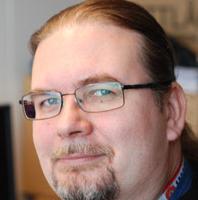Conference Officials
Conference Officials
Conference co-chairs:
Professor Stephen Beeby (University of Southampton, UK)

Stephen P. Beeby obtained a
BEng (Honours) degree in Mechanical Engineering from the Univeristy of
Portsmouth, UK, in 1992. He obtained his PhD from the University of
Southampton, UK, in 1998 on the subject of micromechanical resonators.
Following his PhD, he became a Research Fellow in the School of Electronics
and Computer Science (ECS). He was appointed as a Reader in 2008 and was
awarded a personal Chair in 2011. He was recently awarded a prestigious
EPSRC Leadership Fellowship to investigate the combination of screen printed
materials for energy harvesting on fabrics. His research interests include
energy harvesting, electronic textiles, MEMS and active printed materials
development. He has co-ordinated two EU research projects and is principal
or co-investigator on a further 6 projects. He leads the UK's Energy
Harvesting Network and is a co-founder of Perpetuum Ltd, a University
spin-out based upon vibration energy harvesting formed in 2004. He is also
co-founder and director of two other companies Smart Fabric Inks Ltd and D4
Technology Ltd. He is a member of the ZEROPOWER Scientific Advisory
Committee and the Energy Harvesting Special Interest Group Steering Board.
He has co-authored one book, 'MEMS Mechanical Sensors' (Artech House, Inc.,
Boston, London, 2004) and co-edited 'Energy Harvesting for Autonomous
Systems' (Artec House, Inc., Boston, London, 2010). He has over 180
publications in the field and 8 patents.
Dr Paul Mitcheson (Imperial College London, UK)

Paul D. Mitcheson received
the M.Eng. degree in electrical and electronic engineering and the Ph.D.
degree from Imperial College London, U.K., in 2001 and 2005, respectively.
He became a Lecturer (Assistant Professor) at Imperial College in 2006 and
is currently a Senior Lecturer (Associate Professor) in the Control and
Power Research Group, Electrical and Electronic Engineering Department at
Imperial College London. He has research interests in energy harvesting
devices, in particular the power processing requirements for harvester
powered systems, including RF energy harvesting. He has a parallel line of
work, which also concerns getting power to "hard to reach" places,
investigating inductive power transfer.
School co-chairs:
Professor Einar Halvorsen (Vestfold University College, Norway)

Einar Halvorsen
received the Siv.Ing. (M.Sc.) degree in physical electronics from the
Norwegian Institute of Technology (NTH), Trondheim, Norway, in 1991, and the
Dr.Ing. (Ph.D.) degree in physics from the Norwegian University of Science
and Technology (NTNU), Trondheim, Norway, in 1996. The thesis subjects were
respectively hole scattering in Gallium Arsenide (Siv.Ing.) and statistical
mechanics of strongly correlated electron systems (Dr.Ing.). During 1995 and
1996 he also worked on ultrasound wave propagation in heterogeneous tissue
at Department of Physiology and Biomedical Engineering, NTNU. He
subsequently spent two years as a postdoc with the Department of Physics at
the University of Oslo working on the electronic structure of broken gap
quantum wells. From 1999 to 2004 he worked on design and modeling of surface
acoustic wave devices at Alcatel Space Norway AS and AME Space AS. Since
2004, he has been with the Department of Micro and Nano Systems Technology
at Vestfold University College, Horten, Norway where he is now a professor.
His current research interest is in theory, design, and modeling of
microelectromechanical devices, in particular vibration energy harvesters.
Dr Shad Roundy (University of Utah, USA)

Shad Roundy received his PhD in Mechanical Engineering from the University of California, Berkeley in 2003. From there he moved to the Australian National University where he was a senior lecturer for 2 years. After spending several years working in energy harvesting and MEMS related start-up companies, he joined the University of Utah as an Assistant Professor in 2012. Shad is the recipient of the DoE Integrated Manufacturing Fellowship, the Intel Noyce Fellowship, and was named by MIT's Technology Review as one of the world's top 100 young innovators for 2004. His research interests include energy harvesting and inertial sensing.